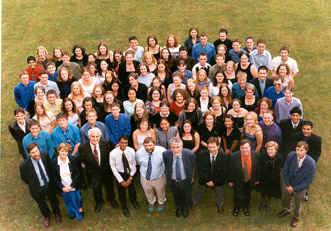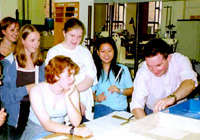Annual Report
1998-99
![]()

The University is building on its efforts to broaden the student base. Its objective is to foster a diverse student body which will embrace students from all parts of the world, and the local area, and include those who are disadvantaged by disability, education or background. The aims are to enrich the academic community and to ensure that able students are not deterred from entering the University. This policy is in line with the Dearing Report on the future of higher education and is promoted by the Higher Education Funding Council for England which ‘will encourage institutions to promote wider participation . . . by introducing funding policies to reward institutions which successfully reach out to disadvantaged and under-represented groups.’
Successful continuing initiatives include the summer schools for state school students, an alternative admissions scheme in Law, residential Continuing Education courses for blind and visually-impaired adults and day-schools for adults with an acquired hearing loss.
 |
Participants and organisers of the University's 1999 Summer School |
Some of the exciting new schemes are described below and Senate has agreed to further initiatives to encourage applications from disabled, part-time, local and mature entrants and those without standard qualifications, to support them in their studies and life at the University, and to encourage the integration of students from all backgrounds.
Guaranteed
first class?
Who gets a First Class Degree? Jeff Odell of the Physics Department has
been analysing the statistics.
Students at independent schools score considerably higher at A-level than their counterparts at comprehensive schools. Bristol graduates tend to come from the schools with highest A-level scores; in other words a large number of schools, principally comprehensives, are under-represented here.
When school performance was compared with degree grade, Odell found, not surprisingly, that on average the students who did best at school also did best at this University. But there was not a dramatic difference in degree grade between the best and the worst performers at A-level, and there were many surprises. Some students, who had scraped into University with less than brilliant A-levels, obtained a First Class Degree at Bristol, and on the other hand some of those with top A-level scores gained a Third Class Degree.
Jeff Odell also studied the average A-level performance of the schools from which Bristol’s 1998 graduates came. He found that, on the whole, of all the students who entered the University with excellent A-levels, those who came from weaker schools gained better degrees than the students from stronger schools. Among those studying at Bristol therefore, A-level results are by no means infallible in predicting success at University. It is also true that, across all subjects, Bristol students from disadvantaged schools perform just as well as those from the ‘best’ schools, despite entering with lower A-level scores.
Jeff Odell’s analysis underpins the University’s new strategy to widen participation, in order to encourage applications from as many students as possible who have the potential to succeed.
Encouraging
female engineers
|
This summer 40 sixth-form girls spent five days at the University as part of a scheme to encourage them to study engineering. They came from areas of the UK currently under-represented in the University, and all were expected to achieve high grades in their A-level science subjects. |
 |
This was the first time that Bristol had participated in the national INSIGHT programme organised by the Engineering and Marine Training Authority and generously funded by local industry.The girls successfully carried out practical mini-projects in the various Engineering departments and spent an interesting day with local companies. Young female professional engineers acted as group leaders during the course. The sixth-formers appreciated their accommodation in Churchill Hall and enjoyed social events which included sports activities and a dinner in Goldney Orangery.
Local students
‘The best thing about the day was learning about university, because before
I came here I didn’t know anything about it and didn’t particularly want
to go, but now I have changed my mind.’ This was the comment of a girl
attending an ACE (Aiming at College Education) day held at Oldfield Girls’
School in Bath attended by 12- and 13-year-olds. Those responsible for
changing her mind were student volunteers who led a programme of events
aimed at encouraging the young people to consider what further and higher
education could offer them.
This was one event in the Access Project run by the Students’ Union. Leading a team of students Naz Sarkar, the President of the Union, visited ten local schools during the year.
The aim was to encourage young people from educationally disadvantaged backgrounds to consider applying to university. Meetings were arranged, sometimes as part of a careers programme, at which the students spoke to sixth-formers about higher education and answered questions on academic and social life. Lucy Foulds, Vice-President of the Union, says, ‘The University volunteers certainly found it an incredibly valuable experience to be involved with this kind of project. Next year, with a pool of keen volunteers coordinated by Suniti Dhupelia, the Access Officer, and Matt Springett, the President, we hope to carry out many such projects and to increase our attendance at careers fairs and school talks in the future.’
Links with
local schools
Over 60 sixth-form tutors and careers advisers
from local schools, colleges of further education and County Careers Offices
attended a half-day conference in June to launch the University’s Widening
Participation Strategy. They were pleased to hear of new initiatives aimed
at increasing the numbers of applications from students from under-represented
groups. Naz Sarkar, President of the Union, described the Student Access
Project and a panel of University admissions tutors fielded a range of
questions, including enquiries about alternative admissions schemes.
The University is forging a closer link with its nearest state school neighbour, Cotham Grammar School. Several departments are already in close contact and it has now been agreed that staff from the school shall attend research seminars and departmental or public lectures in their fields.
Research into widening
participation
Gillian Squirrell, Lecturer, and John Furlong,
Professor of Education, were awarded an eight-month contract (from March
to October 1999) to investigate why comparatively few people living in
inner-city areas in the South West take part in higher education. The
target group for the research were people living in wards designated as
economically and socially deprived using the DETR Index of Local Deprivation.
The study has focused on wards in Bristol and Plymouth.
Two sister projects investigated low participation rates in rural areas (conducted by the University of Exeter), and mapped provision and deprivation across the whole South West Region (conducted by Cornwall College). This work in the South West was funded by the Higher Education Funding Council for England and there are similar projects throughout the country. They support the Government’s concern to increase participation in higher education, to broaden the base of people attending and to encourage universities and colleges to draw students from their local region.
The researchers have found that young people living within these wards, even though they are living within university towns, do not consider that university is for them if they have not had other family members attend university. Travel is a problem, even within inner city areas. There are perceptual barriers about university education as being something for others.
For such young people it is important to raise their awareness about higher education and to persuade them to consider their longer-term learning from their time of entry into secondary school. It is also important to work with their families and involve them in educational activities. It is essential to dispel myths about higher education, to find effective progression routes into it and to encourage young people to understand that a decision taken at 14 does not close the doors on a university education for the rest of their lives.
The research team found that summer schools and other taster activ-ities were influential for those who had no family members in higher education.
These, like the one run at Bristol, encourage young people to attend lectures and university activities to discover for themselves what it might be like to experience university.
Other initiatives include working with schools and colleges to encourage young people to think about university education and realise their aspirations. These may be training days about their longer-term choices, or visits from students to talk about the realities of university or college, or on-going mentoring schemes involving university students. Many of these activities are ones in which Bristol University students are involved.